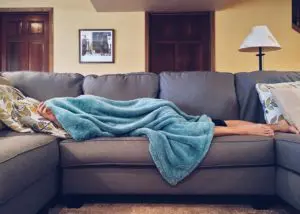25 Oct I Don’t Snore: Could I Still Have Sleep Apnea?
 While loud snoring is often an indicator of sleep apnea, the absence of this symptom doesn’t necessarily mean that a patient doesn’t have sleep apnea. This condition is caused by repeated pauses in breathing during sleep due to either obstruction of the airway opening or a disruption in the signals from the brain. Sleep apnea also is associated with symptoms such as daytime drowsiness and frequent sore throats or headaches upon waking, so if you notice these issues, you may want to look into them a little more.
While loud snoring is often an indicator of sleep apnea, the absence of this symptom doesn’t necessarily mean that a patient doesn’t have sleep apnea. This condition is caused by repeated pauses in breathing during sleep due to either obstruction of the airway opening or a disruption in the signals from the brain. Sleep apnea also is associated with symptoms such as daytime drowsiness and frequent sore throats or headaches upon waking, so if you notice these issues, you may want to look into them a little more.
In order to get effective sleep apnea treatment, you must first complete a sleep study to confirm the diagnosis and determine whether your sleep apnea is obstructive or a different type. The nature of the apnea will influence the treatment.
After you have a diagnosis of obstructive sleep apnea, you can consult with an oral surgeon to learn about your treatment options. While continuous positive airway pressure (CPAP) masks are very effective at keeping the airway open throughout the night, many patients also find them so cumbersome that wearing the mask itself interferes with sleep. An oral surgeon may be able to offer you more comfortable options.
For example, some patients will get relief from sleep apnea symptoms by wearing an oral appliance that holds either the tongue or the jaw in a more forward position during sleep. This reduces the likelihood that the soft tissues at the back of the throat will slide back and cover up the airway opening.
A surgeon may also remove some of that excess soft tissue to eliminate the conditions contributing to the sleep apnea. This procedure is completed on an outpatient basis.
If you show any signs of having sleep apnea, even if you don’t snore, it’s important to have them evaluated. Because the apneic episodes repeatedly deprive the body of oxygen during sleep, sleep apnea can have a cascade of serious health effects. The condition appears to have some link with heart disease and stroke, for example.
If you suspect that you may have sleep apnea, you can call our office to get information on completing a sleep study and then follow up with us to learn about your treatment options. Call our office at Commonwealth Oral & Facial Surgery today.

